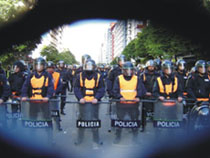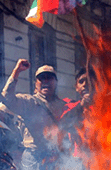
Social Security in Danger
Breaking ranks with every former president, Republican and Democratic alike, President George W. Bush is engaged in a high-profile campaign to undo Social Security. He hopes to accomplish what has eluded his ideological brethren who fought for similar ends over the last 70 years. Like Representative Carl Curtis in the late 1940s and early 1950s, Bush seeks to curtail the benefits of all but the lowest-paid workers, so that all beneficiaries would receive meager, basically flat benefits, largely unrelated to earnings.

.gif)

